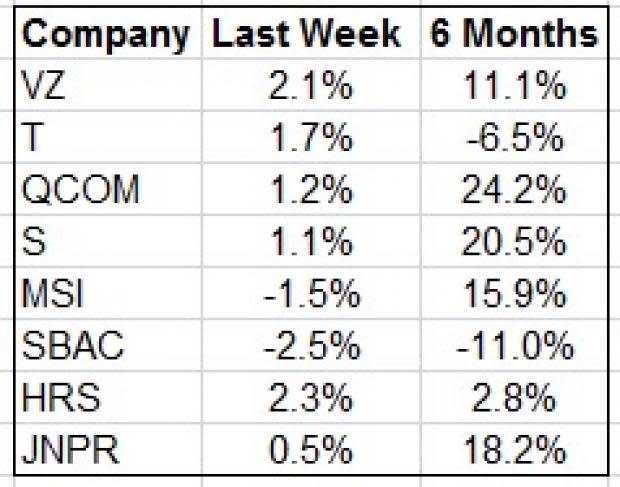Telecom Stock Roundup: Harris to Power F-35, BlackBerry Kicks Off Sector Earnings
In the past five trading days, telecom stocks initially rallied on optimism over improving economic fundamentals, as traders eventually shrugged off concerns regarding the burgeoning trade war. It seemed as if the equity markets have already factored in the repercussions from the prevailing tariff war between the United States and China, and showed resilience in the face of adversity. However, the stocks followed a flat trajectory, thereafter, and declined slightly at the end of the week on concerns regarding the fallout of the net neutrality law passed by California.
The U.S. GDP reportedly increased 4.2% in the second quarter — the highest in almost four years — and is well on track to meet President Trump’s annual growth target of 3%. Improved data on most economic metrics depict a bustling American economy that is weathering the doldrums caused by the escalating trade tensions between the Republican administration and other countries, including China. Increased job creation, higher wage rates, tax overhaul and bumped-up government outlays on construction projects are likely to further spur the economy to continue its growth momentum.
Nevertheless, the telecom firms faced a setback when California Governor Jerry Brown passed a net neutrality bill which aims to offer a level playing field to Internet users by thwarting any effort of carriers from blocking or slowing down online traffic to broadband customers. The law also intends to prohibit ‘zero rating’, that gives telecom providers an opportunity to enforce unlimited streaming of certain sites for free but levy a charge for others. The firms argue that the law represents a "classic example of unconstitutional state regulation" and have filed a legal suit to block its passage. Even the Trump administration has sued California, citing that the state has exceeded its jurisdiction to pass a law on a subject that falls entirely under the purview of the federal government.
Amid such cacophony, Chinese telecom giant Huawei has urged the Federal Communications Commission (FCC) to allow it to sell telecommunication equipment to U.S. firms for faster 5G deployment. It argued that by debarring firms which receive government funding from purchasing components from manufacturers that pose a security threat, FCC is discouraging competition and hindering innovation in the market. Incidentally, the Trump administration is reportedly intensifying a campaign to prevent Huawei from building a communications network in Papua New Guinea, in order to curb its influence in the region.
Regarding company-specific news, product launches, strategic deals, legal battles and earnings took the center stage over the past five trading days.
Recap of the Week’s Most Important Stories
1. Harris Corporation HRS has secured a plum contract, for an undisclosed amount, to deliver next-generation Integrated Core Processor (ICP) for F-35 fighter jets. The deal aims to reduce production costs of the jets while improving its performance.
The ICP acts as the brain of F-35, and enables it to process data for communications, sensors, electronic warfare, guidance and control, cockpit and helmet displays. It helps integrate all other electronic systems previously managed by separate mission and weapons computers, and dedicated signal processors. Furthermore, ICP provides the pilot with 360-degree situational awareness of threats, and accordingly prioritize and recommend measures to negate those. (Read more: Harris to Power F-35 With Next-Gen Computer Processor)
2. In a concerted move to augment the rapidly evolving needs of public safety, Motorola Solutions, Inc. MSI has decided to integrate the advanced video analytics feature of Avigilon Control Center video management software into CommandCentral Aware. This software will enable first responding officers to act promptly, limit criminal activities and manage time effectively, courtesy of enhanced video analyses.
CommandCentral Aware forms an integral part of Motorola’s end-to-end suite of command center software that enables seamless handling of an emergency situation soon after a 9-1-1 call is placed. With the integration of Avigilon Control Center video management software, a real-time intelligence feed backed by video analytics, incident details, alerts, data mapping and responder location will enable rescue workers and security forces to better handle the situation. (Read more: Motorola Integrates Avigilon Advanced Video Analytics Feature)
3. In a mixed verdict for QUALCOMM Incorporated QCOM, a U.S. International Trade Commission judge accepted that Apple Inc.-manufactured iPhones infringed one of the patents of the former, but refused to ban the import of the mobiles in the country citing broader public interests.
Qualcomm observed that the verdict was a bit of oxymoron, as although the judge accepted that Apple infringed its patents related to power-management technology, it was allowed to continue with the sale of the products across the domestic market. The company further lamented that the judge did not exercise any other means to stop the technology infringement without affecting public interests. (Read more: Qualcomm's Import Ban Plea for Apple iPhone Faces Dismissal)
4. AT&T Inc. T has expanded its Fixed Wireless Internet service across the rural and underserved locations in Alabama. With this endeavor, the company rolled out broadband connectivity in 18 states across the United States.
Through Fixed Wireless Internet service, AT&T will offer an Internet connection with download speed of at least 10Mbps and upload speed of at least 1Mbps. The connectivity is facilitated through a wireless tower and is routed via a fixed antenna placed on the customer’s home. This cost-effective Internet connection is arguably one of the best methods to deliver high-quality faster broadband to customers in underserved rural areas. (Read more: AT&T Extends Broadband Connectivity Across Rural Alabama)
5. BlackBerry Limited BB reported healthy financial results for second-quarter fiscal 2019 (ended Aug 31, 2018), driven by growth in BlackBerry Technology Solutions, and Enterprise Software and Services businesses.
Non-GAAP net income was $21 million or 4 cents per share compared with $26 million or 5 cents per share in the year-ago quarter. The bottom line beat the Zacks Consensus Estimate by 2 cents. Total non-GAAP revenues were $214 million compared with $249 million reported in the year-earlier quarter. Software and services non-GAAP revenues were $197 million, up 1% year over year. The top line surpassed the Zacks Consensus Estimate of $213 million. (Read more: BlackBerry Surpasses Q2 Earnings and Revenue Estimates)
Price Performance
The following table shows the price movement of some of the major telecom stocks over the past week and during the past six months.

In the past five trading days, Harris was the major gainer, with its share price increasing 2.3%. SBA Communications Corporation SBAC was the major decliner, with its stock losing 2.5%.
Over the past six months, Qualcomm has been the best performer, with its stock appreciating 24.2%, while SBA Communications declined the most, with its shares falling 11%.
Over the past six months, the Zacks Telecommunications Services industry recorded an average decline of 0.4%, while the benchmark S&P 500 Index gained 10%.

What’s Next in the Telecom Space?
In addition to continued product launches and deployment of 5G technologies, all eyes will remain glued to how the industry fares against the net neutrality law.
5 Companies Verge on Apple-Like Run
Did you miss Apple's 9X stock explosion after they launched their iPhone in 2007? Now 2018 looks to be a pivotal year to get in on another emerging technology expected to rock the market. Demand could soar from almost nothing to $42 billion by 2025. Reports suggest it could save 10 million lives per decade which could in turn save $200 billion in U.S. healthcare costs. A bonus Zacks Special Report names this breakthrough and the 5 best stocks to exploit it. Like Apple in 2007, these companies are already strong and coiling for potential mega-gains.
Click to see them right now >>
Want the latest recommendations from Zacks Investment Research? Today, you can download 7 Best Stocks for the Next 30 Days. Click to get this free report
SBA Communications Corporation (SBAC) : Free Stock Analysis Report
QUALCOMM Incorporated (QCOM) : Free Stock Analysis Report
Motorola Solutions, Inc. (MSI) : Free Stock Analysis Report
Harris Corporation (HRS) : Free Stock Analysis Report
AT&T Inc. (T) : Free Stock Analysis Report
BlackBerry Limited (BB) : Free Stock Analysis Report
To read this article on Zacks.com click here.
Zacks Investment Research

 Yahoo Finance
Yahoo Finance 
